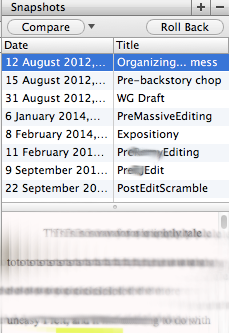Why I’m A Draft Packrat
In the five years I’ve been writing this novel, I’ve done everything you’re not supposed to do. I let things sit for weeks or months, until I “felt” like writing. I wrote slow, under the misguided assumption that the words had to come out perfect the first time. I edited, edited, edited well before I ever had a first draft done. Don’t feel much like writing today… I’ll polish that last chapter I wrote! Only to have to cut the chapter later, and feel like a jerk for wasting my own time.
Plus, plot and characters changed so many times mid-draft that there were several drafts I abandoned entirely to start over from page one. That happened, oh, four or five times. Nearly every scene in the book has existed in so many different permutations, I sometimes forget what “version” I’m favoring currently.
And yet, I’ve never thrown any of it away. I have folder upon folder of draft discards: deleted lines, deleted scenes, the full drafts abandoned midway through.
Why? Because, even when I’m sure that what I’m cutting is best destroyed for the sake of mankind, I often find myself missing a certain description or scene later, and wanting to add it back. Fishing through earlier drafts spares me the angst of having to write it anew!
Even better, I eventually switched to writing in Scrivener, which made my packrat behavior much easier to manage. One of the main reasons I favor Scrivener over other writing tools is its snapshot feature. I can take a snapshot of any scene before I change it. That snapshot is then preserved for all time. I can go back and pull lines out of it- or revert back to the snapshot version wholesale.
 These are just for my first chapter…
These are just for my first chapter…
The only problem is remembering to take a snapshot before I make changes- which I usually do, but occasionally I’ve forgotten. It’d be nice if Scrivener had an option where it prompts you to snapshot the first time you start typing in a scene. Not a big deal, though; I’ve never lost anything I couldn’t recover from.
Along with the snapshots, I also maintain a special file of cut lines/dialogue/etc. that I still like- just in case I might have use for those lines elsewhere.
If you don’t have Scrivener, I recommend keeping a folder or file of your discards. You never know when they might save your butt, and you can always delete them after the book is done! Of course, you should also be backing up all of your files on a regular basis.
Do you keep your discards? Or do you prefer a different system of retrieval? Let me know in the comments!
